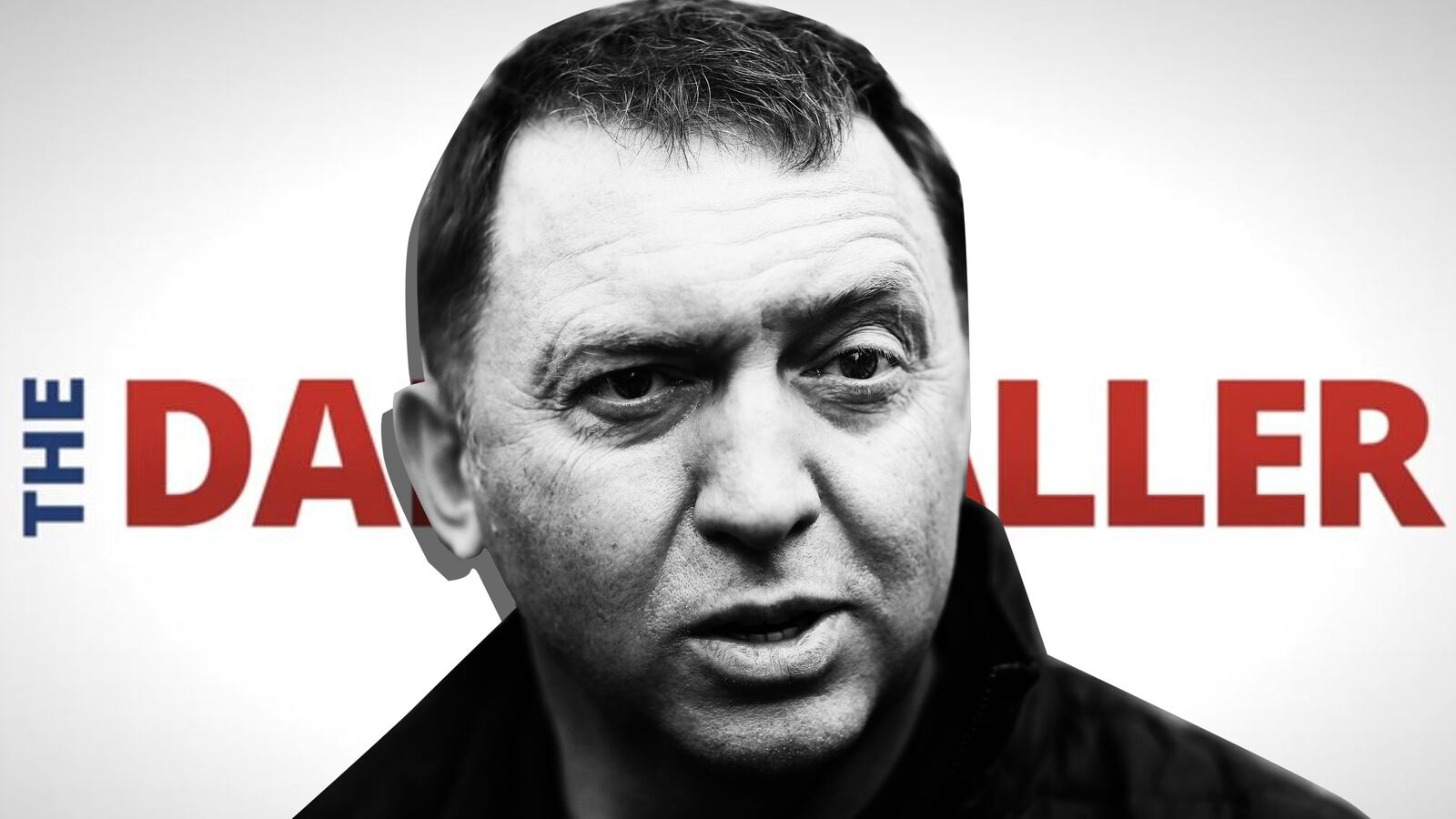Oleg Deripaska is in the news again, as he occasionally tends to be. Deripaska is a Russian billionaire who is intimately tied to the Kremlin’s corrupt and autocratic regime. Think of a villain in a James Bond movie—a wealthy, impeccably dressed and monstrous gangster with a huge yacht and an annoying grin that Bond will surely address.
According to the Senate Select Committee on Intelligence, Deripaska has “acted as a proxy for the Russian state and intelligence services” since at least 2004. Deripaska’s name appears a whopping 340 times in the Senate report, not including the vast multitude of parts that are censored for intelligence reasons.
“Deripaska has managed and financed Kremlin-approved and -directed active measures campaigns, including information operations and election interference efforts.” He “conducts influence operations” outside of Russia. He has worked tirelessly “to install pro-Kremlin regimes” and—pay attention to this part—“to control local economies and politicians” in nations all over the world. And don’t kid yourself: Our government is most definitely among the governments that Russia’s regime seeks to control.
Paul Manafort, an imprisoned felon who was the chairman of Donald Trump’s 2016 presidential campaign, worked with Deripaska through Konstantin Kilimnik, a Russian intelligence officer. (So we are clear: a Russian intelligence officer is a trained, professional, paid spy.)
I’d like to regale you with a little story about the time I worked with Deripaska. It’s truly a tempest in a teapot, but it illustrates a much larger, more dangerous truth. Bear with me.
Back in 2018, I was the opinion editor for The Daily Caller. I had worked for the website for about five years as a journalist and editor. I really believed in what we were doing. I believed in what founders Tucker Carlson and Neil Patel said they were building. (More on that later.)
In early March 2018, Deripaska submitted an opinion piece to The Daily Caller. He didn’t submit it directly to me or through the Caller’s conventional submissions process. Presumably, villainous Russian billionaires are above such hoi polloi procedures. Instead, Daily Caller publisher Patel contacted me directly one day saying he had received Deripaska’s op-ed. He wanted to know how I felt about it.
I hated it. Anyone with a passing knowledge of European politics would know who Deripaska is and what he represents. I had been in the U.S. foreign service for a bit, so, of course, I knew.
More importantly, Deripaska’s op-ed itself was—and remains—an extraordinary exercise in audacious Russian propaganda.
“The ever-changing ‘Russia narrative’ in American politics is today’s Wag the Dog scenario,” Deripaska wrote (or, more likely, had ghostwritten), citing the 1997 movie about a fake war starring Dustin Hoffman and Robert De Niro.
Deripaska went on to weave a fantastic conspiracy theory which is fundamentally at odds with the findings of the United States Senate. He describes American foreign policy experts as “the ‘Deep State,’” which, he claimed, is “shadow power exercised by a small number of individuals from media, business, government and the intelligence community, foisting provocative and cynically false manipulations on the public.”
The Russian billionaire complained that American foreign-policy professionals have “scurrilously attacked” him “for two decades.”
After several paragraphs suggesting a host of strange conspiracies fit for a late Stalin purge, Deripaska attempted to quote Abraham Lincoln and then suggested that the U.S. foreign policy establishment has “invented narratives” that “impede internationally shared efforts on the world’s most pressing, real issues.”
At the time, I told Patel I had deep reservations about publishing Deripaska’s op-ed. I would reject it, I said. But Patel wanted to publish the piece and so, of course, that’s what I did.
Naturally, people noticed. And noticed. And noticed some more.
All these people noticed for very good reason: In addition to maintaining inseparable relationships with Russia’s autocrats and conducting influence operations for them, Deripaska is an alleged crook. The United States government has flatly branded Deripaska as an allegedly murderous mafia goon.
On April 6, 2018—curiously, just a month after Deripaska submitted his Daily Caller op-ed— the United States Treasury Department and the U.S. Department of State designated him (and some other Russian oligarchs) for a litany of crimes that would impress John Wayne Gacy. (“Designated” sounds milquetoast, but it’s a serious term reserved uniquely for terrorists, for mega-narcotics traffickers and for nations that stand officiously athwart American interests).
In a press release announcing Deripaska’s designation, Treasury Secretary Steven Mnuchin observed that Russia’s government operates primarily to benefit billionaire cronies like Deripaska, and that Russian officials busy themselves “attempting to subvert Western democracies.”
The Treasury Department alleged that Deripaska has engaged in murder for hire. Treasury officials also cited Deripaska for money laundering, bribery, threatening to murder various business competitors, illegally wiretapping an official of an unidentified government and all manner of extortion and racketeering. And the U.S. government has massively sanctioned Deripaska—freezing a slew of his assets and threatening to punish bankers in any cranny of the world who try to circumvent the sanctions.
And so The Daily Caller published an in-the-flesh James Bond villain weaving conspiracy theories and implicating American citizens in bizarrely fictional “Deep State” crimes—catnip for the conservative media audience he is all-too-familiar with. He had virtually nothing to say about U.S.-Russian relations. He didn’t even have anything to say about villainy. It was just propaganda.
I can’t speak for Patel or for Carlson, who had largely left The Daily Caller for cable-news stardom by then, but the general sentiment at the Caller always seemed to be that all publicity—and, of course, all those precious, precious page views—was wonderful. The throng of page views was certainly good for my little opinion section, which had been downright beleaguered before I took over.
But I felt terrible. I felt dirty. It was the beginning of the end for me at The Daily Caller. Around that time, I found out my blood pressure was crazy high.
“Are you stressed out at work?” the doctor asked.
“Maybe,” I said.
So I quit the job. My relationship with The Daily Caller—and with what we can call the American right—was already under great strain since the 2016 election, and it has since deteriorated pretty completely.
And that’s the end of my little story. As I say: Tempest in a teapot.
The Daily Caller trudges forth just fine without me. Carlson, who from a social perspective will always be a genuinely amazing human being, seems to be getting swell ratings.
In a broader sense, though, America’s right-wing media environment has become a hellscape.
When Carlson and Patel launched The Daily Caller in 2010, the goal was laudable and straightforward: to build a first-class, objective news organization. Sure, they probably wanted to staff it mainly with conservatives. They did. But Carlson was interested first and foremost in facts. (As an aside, one of my favorite Tucker-isms is never to call anything “controversial.” Describe the controversy, because that’s the news, see.)
“People want reliable information they’re not getting other places,” Carlson told the Columbia Journalism Review in 2011. “If that’s right-wing, the world has turned upside down.”
“I’m not running around whining about media bias, because I think it’s both pointless and unattractive, and I hate whining—that’s why I’m not a liberal in the first place. And I don’t think it as simple as ‘all reporters are Democrats,’” Carlson also said in the 2011 interview.
Discussing the then-noteworthy Tea Party movement, he added: “If you can be the site that writes straightforward stories about what this suddenly significant political movement is all about, you could probably do pretty well. That’s our goal.”
And yet fast-forward seven years later, to the 2018 Deripaska op-ed. Recall that the Senate’s report speaks of Deripaska’s “Kremlin-approved and -directed active measures campaigns.” Recall that the Treasury Department cited Deripaska for an array of crimes, including murder.
How can Carlson and Patel fail to see that the Deripaska op-ed about a “Deep State” was a very real part of exactly this sort of Kremlin-approved campaign? How can they not feel like suckers used by a hostile foreign nation?
Carlson and Patel—and a host of others (Breitbart, etc., etc.)—tried to give Americans a choice by creating new media organizations to compete with existing major news organizations. And that’s good. Choice is good. Competition is good.
But something happened on the way to that place. The Daily Caller is no longer an alternative news organization. Breitbart is no way in hell any kind of alternative news organization.
These aren’t alternative news websites. Too many times, they are alternative realities, complete with alternate sets of facts. It’s an epistemological nightmare.
And, in the case of the 2018 Deripaska op-ed, which I myself published and placed despite my own doubts and qualms, The Daily Caller was the plaything of a Russian billionaire working directly with Russian spies who used conservative media to spout completely false and fabulous conspiracy theories.
--
Eric Owens was a writer and editor at The Daily Caller from 2012 to 2018.



